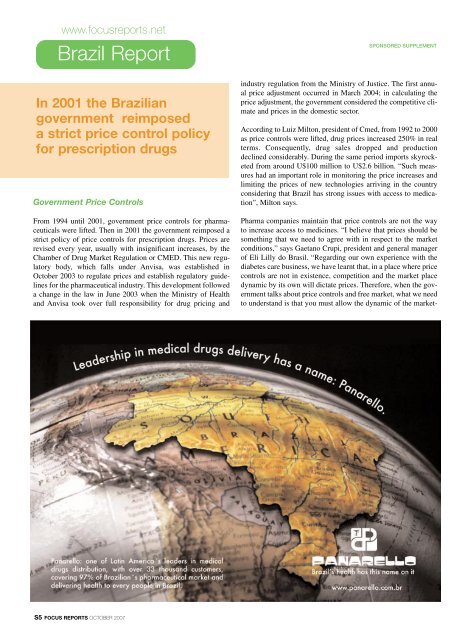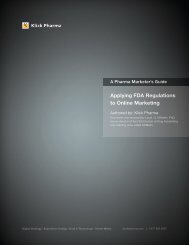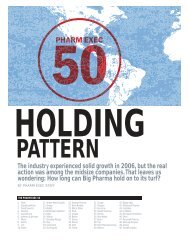When Girls Take the Lead - Pharmaceutical Executive
When Girls Take the Lead - Pharmaceutical Executive
When Girls Take the Lead - Pharmaceutical Executive
Create successful ePaper yourself
Turn your PDF publications into a flip-book with our unique Google optimized e-Paper software.
www.focusreports.net<br />
Brazil Report<br />
In 2001 <strong>the</strong> Brazilian<br />
government reimposed<br />
a strict price control policy<br />
for prescription drugs<br />
Government Price Controls<br />
From 1994 until 2001, government price controls for pharmaceuticals<br />
were lifted. Then in 2001 <strong>the</strong> government reimposed a<br />
strict policy of price controls for prescription drugs. Prices are<br />
revised every year, usually with insignificant increases, by <strong>the</strong><br />
Chamber of Drug Market Regulation or CMED. This new regulatory<br />
body, which falls under Anvisa, was established in<br />
October 2003 to regulate prices and establish regulatory guidelines<br />
for <strong>the</strong> pharmaceutical industry. This development followed<br />
a change in <strong>the</strong> law in June 2003 when <strong>the</strong> Ministry of Health<br />
and Anvisa took over full responsibility for drug pricing and<br />
S5 FOCUS REPORTS OCTOBER 2007<br />
SPONSORED SUPPLEMENT<br />
industry regulation from <strong>the</strong> Ministry of Justice. The first annual<br />
price adjustment occurred in March 2004; in calculating <strong>the</strong><br />
price adjustment, <strong>the</strong> government considered <strong>the</strong> competitive climate<br />
and prices in <strong>the</strong> domestic sector.<br />
According to Luiz Milton, president of Cmed, from 1992 to 2000<br />
as price controls were lifted, drug prices increased 250% in real<br />
terms. Consequently, drug sales dropped and production<br />
declined considerably. During <strong>the</strong> same period imports skyrocketed<br />
from around U$100 million to U$2.6 billion. “Such measures<br />
had an important role in monitoring <strong>the</strong> price increases and<br />
limiting <strong>the</strong> prices of new technologies arriving in <strong>the</strong> country<br />
considering that Brazil has strong issues with access to medication”,<br />
Milton says.<br />
Pharma companies maintain that price controls are not <strong>the</strong> way<br />
to increase access to medicines. “I believe that prices should be<br />
something that we need to agree with in respect to <strong>the</strong> market<br />
conditions,” says Gaetano Crupi, president and general manager<br />
of Eli Lilly do Brasil. “Regarding our own experience with <strong>the</strong><br />
diabetes care business, we have learnt that, in a place where price<br />
controls are not in existence, competition and <strong>the</strong> market place<br />
dynamic by its own will dictate prices. Therefore, when <strong>the</strong> government<br />
talks about price controls and free market, what we need<br />
to understand is that you must allow <strong>the</strong> dynamic of <strong>the</strong> market-






